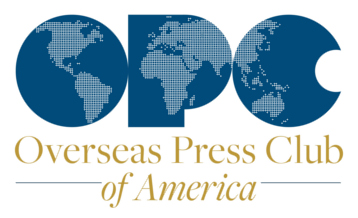Press Freedom
CPJ Updates
- Alarm bells: Trump’s first 100 days ramp up fear for the press, democracy
- 2024 is deadliest year for journalists in CPJ history; almost 70% killed by Israel
- In record year, China, Israel, and Myanmar are world’s leading jailers of journalists
- Haiti, Israel most likely to let journalists’ murders go unpunished, CPJ 2024 impunity index shows
- No justice for journalists targeted by Israel despite strong evidence of war crime
- On Edge: What the US election could mean for journalists and global press freedom
- Forced to flee: Exiled journalists face unsafe passage and transnational repression
- Israel-Gaza war brings 2023 journalist killings to devastating high
- 2023 prison census: Jailed journalist numbers near record high; Israel imprisonments spike
Reporter Without Borders

OPC Urges Governments to Roll Back Media Restrictions on World Press Freedom Day
 Over the last year, governments around the world have exploited the global pandemic as an excuse to block access to crucial public information and crack down on press freedom. These restrictions are growing even as the spread of disinformation and confusion puts lives at risk and highlights the need for rigorous journalism and fact checking during crises.
Over the last year, governments around the world have exploited the global pandemic as an excuse to block access to crucial public information and crack down on press freedom. These restrictions are growing even as the spread of disinformation and confusion puts lives at risk and highlights the need for rigorous journalism and fact checking during crises.
To mark World Press Freedom Day on May 3, the Overseas Press Club of America joins global press freedom advocates in calling for countries to roll back restrictions designed to hamper coverage.
“Journalists should be allowed to do their jobs without fearing retribution or censorship,” said Peter Spiegel, chair of the OPC’s Press Freedom Committee.
The theme of the United Nations event this year, “Information as a Public Good,” focuses on improving production, distribution and reception of journalism, and to boost transparency in public information.
According to Reporters Without Borders, there has been a 12 percent decline in media freedom worldwide since 2013.
Meanwhile, journalists have also faced increased risks, with the Geneva-based Press Emblem Campaign reporting that at least 1,060 media workers died from COVID-19 between March 2020 and April 10 2021.
The OPC draws attention to the following urgent press freedom threats:
China has ramped up its use of digital censorship, surveillance and propaganda while expelling foreign journalists reporting on COVID-19 cases. It remains among the lowest-ranked countries in the world for press freedom overall, ranking third to last on the World Press Freedom Index, with aggressive moves against media such as the conviction of publisher Jimmy Lai and others targeted with the national security law in Hong Kong.
Many other governments have used COVID-19 as an excuse to restrict access to public information. The Freedom of the Press Foundation reported in December that arrests of journalists in the U.S. ballooned by more than 1,200 percent compared to 2019, including for charges of violating pandemic-related curfews. Iran imposed measures to prevent news media from reporting on the country’s COVID-19 death toll. In Tanzania, the government called the pandemic a “western conspiracy” and used it to justify force against journalists and impose an information blackout. Serbia and Zimbabwe imposed restrictions on reporting the pandemic and other sensitive topics have led to journalists being jailed. In Central and Eastern Europe, the Council on Foreign Relations reported that press freedoms are shrinking as authoritarianism rises, with the government filing lawsuits against hundreds of journalists in Poland, anti-disinformation laws that criminalized legitimate reporting in Hungary, increasing government pressure on journalists in Slovenia and rising attacks in Slovakia.
Governments have also increased censorship and imposed new restrictions on online news operations. In India, the government used digital media rules imposed in February to censor online news. Bangladesh invoked its digital security law to jail cartoonist Kabir Kishore, who was released in March and reported that he had been tortured while in custody. The European Parliament on April 28 approved rules that allow governments to order internet companies to remove online content deemed to be “terrorist content” within one hour without judicial oversight, a move press freedom and civil rights groups fear could be used to ban material governments do not agree with. Un the U.S., press freedom groups are watching a pending U.S. Supreme Court decision that would affect crucial digital collection tools for data journalism.
